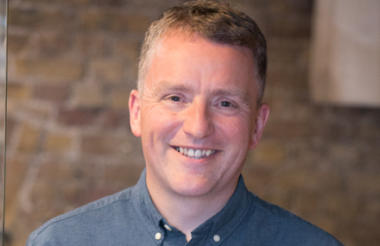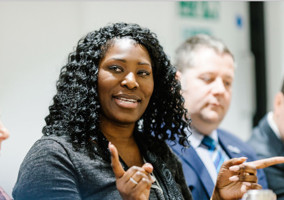The world has fundamentally altered since Karl Wilding took on one of the biggest jobs in the charity sector just over a year ago. As he puts it, years of change have been “telescoped” into months.
Charities are facing greater pressures on funding and demand than possibly ever before, while new challenges that couldn’t have been foreseen have arisen.
It’s into this environment that NCVO, which is the largest representative body in the sector with 15,000 members, launches its new strategy.
Central to the strategy is Wilding’s conviction that the sector should function more as a system, with a greater emphasis on voluntary organisations building strong connections with each other, so that they are able to properly harness the enthusiasm of volunteers who want to change the world.
“It's critical not just to NCVO's future but to the future of the sector that our voluntary sector works more like a system, where we come together to do things,” he explains.
An example he highlights is the British Red Cross’ decision back in November 2019 to step back from delivering first aid at public events, in recognition that St John Ambulance was better placed to do so.
Banging the drum for charities
Wilding describes NCVO’s members as “our greatest asset”, and says he wants NCVO to be “very much a member-centred organisation”. This means acting “as a convenor, as the platform of our members to come together and share knowledge and insight”.
“Whether that's about the influencing and lobbying work that we do or the service delivery, we recognise that a lot of the time our members are the experts. They have the lived experience,” he explains.
A key part of this is doing more to shine the spotlight on the work of brilliant charities, he says. “Too often that work is under the radar.”
He adds: “One of the things that they [members] say to us consistently and what they really want is that they want people to go out and bang the drum on behalf of charities and volunteering.”
He’s not surprised that the public, by and large, don’t really understand what the modern voluntary sector looks like, because “people have limited time and attention, with so many competing demands on their time”.
‘We’re the National Council for Voluntary Organisations, not the London Council for Voluntary Organisations’
NCVO’s remit covers the whole of England (Wales, Scotland and Northern Ireland have their own representative bodies), but with a head office in London, there is an obvious risks of becoming too caught up in the events and concerns of the capital.
“I think we have to seriously think about whether everyone who works for NCVO needs to be based in London,” Wilding says.
NCVO used to have offices around the country, and while opening new offices is not on the cards, he suggests staff could be based in member offices.
Indeed, Wilding spent much of the first two years of his career with NCVO working in the offices of GMCVO in Manchester.
“I think that did me the world of good in terms of getting a sense of perspective,” he says.
Another reason for NCVO to be connected across the country is that devolution has meant there are now a plethora of different regional bodies that charities need to engage with, such as metropolitan mayors and police and crime commissioners.
However, Wilding says these structures can often be “quite messy” and “hard to understand”, which is another reason why NCVO must be work closely with its members. “There's no way that we can understand, or keep in touch with, everything that's going on.”
Using NCVO’s power and privilege
Traditionally, NCVO has been known for (and sometimes criticised for) taking an “insider” approach to influencing. This means building strong relationships with policymakers, but largely operating behind the scenes.
The opposite approach is to effect change via public campaigns, protests and high-profile media coverage. But Wilding argues that the idea of a binary division between the two comes “from an era when maybe organisations just did things on their own and they weren't part of wider networks and collaborations”. This, he says, does not reflect a more collaborative approach to influencing policy that is the reality today.
“Over the past decade there has been more influencing and campaigning work in our sector where organisations are coming together as part of collaborations, with different organisations playing different roles.”
NCVO is not going to stop talking to politicians and civil servants behind the scenes. However, Wilding plans to shift the focus to showcasing members’ experiences, and bringing some of them along to meetings, in order to “give them voice and power, rather than speaking for them. You have got to use your privilege to put them first.”
It’s getting harder to run a charity
Alongside NCVO's influencing and policy function, the organisation provides members with practical support about running a charity. Even without the Covid-19 crisis, it was expecting the demand for this support to increase.
Partly this is because NCVO's membership has been increasing, and partly because there are ever-increasing demands on charity leaders.
Wilding explains: “We are told sometimes that it feels like the hurdles you have to jump over to run a voluntary organisation get higher. It's really hard leading and running a charity.”
At the same time, many people who seek a career in the sector or become a trustee are driven by the cause and that is where their expertise is, making support on legal requirements and best practice all the more important.
Wilding sees NCVO’s role as to “harnesses the knowledge and skills and insights” of people who have found solutions and make sure it is “shared across the sector”.
Moral imperative to collaborate
As is the case across the sector, NCVO has been hit by the financial impact of Covid-19.
It has restructured and reduced its senior leadership team, and a consultation with staff is likely to lead to 13 redundancies. NCVO's conference suite business, which subsidised some of the organisation's other activity, has been unable to operate for most of the year.
“That essentially means that we have less resource, so we are going to have to make some choices and we are going to have to do less,” Wilding says.
He believes this near-universal squeeze on budgets is giving organisations the “nudge” they might need to work more collaboratively.
“I genuinely believe that there is a moral imperative upon us to work in collaboration with the other infrastructure organisations on behalf of the sector,” he says.
How does he expect to sustain this closer working relationship? “For me the answer to that first of all is leadership, and an approach to leadership that emphasises generous leadership, that recognises that we don't just lead our own organisations but we have to lead the sector. I think that means recognising that we have a job to support each other and to share with each other.”
Another key aspect is knowing when to stop and stand back.
“The hardest thing in the voluntary sector, without a shadow of a doubt, is stopping doing things,” he says. “I hope that the Covid crisis is an opportunity to recognise that not just at NCVO but right across the piece sometimes that actually there may be a better organisation than us, rather than everyone trying to do too many things.”
2020 has challenged some of the orthodoxies about sustainability
“This has probably been the most difficult year for not just our sector but for the country since the Second World War. I don't think that's hyperbole,” Wilding says.
“It also strikes me that it has fundamentally challenged some of the orthodoxies of the last 20 or 30 years about shifting away from donated income to earned income,” he says, due to “the fact that our ability to trade for example has, well, it has been taken away from us, especially during the lockdown phases.”
He says it has also highlighted that the complex financial models adopted by charities, with “cross-subsidisation and drawing income from different sources”, are rarely understood outside of the sector. The outcome is that policymakers struggle to understand “the idea that mothballing your staff may not be a very good idea”.
Wilding is, rightly, worried about the financial vulnerability of charities right across the sector. “We're just hitting the crisis wall, which you hit six months into an emergency where everyone is exhausted, and we know that large parts of the sector, while they have reserves, those reserves are quite thin.”
Reserves, typically between three and six months’ expenditure, are “there for a rainy day”, he explains, but “it has been chucking it down for some time, and we can only survive a storm for so long”.
However, he feels there is “solace from the fact that this is a resilient sector”, which is used to developing innovative financial models.
“I don't think we should be packing up and giving up hope. We have some brilliant, brilliant leaders in the sector who will find a way. But if my conversations are anything to go by, a number of them are exhausted and we have got to make sure that we get in behind them and support them.”
‘People want to be part of something bigger, charities can give them that’
Wilding highlights another cause for optimism, which is that early in the pandemic, the UK saw a wave of enthusiasm for volunteering and community activity.
“For me, Covid demonstrated that people want to be part of something bigger and they want to change the world. So if I was going to be optimistic as well as challenged about the future, it would be that people do still want to change the world,” he says.
Clearly this is a “huge opportunity” for volunteering, he says, as long as charities can adapt and offer ways to get involved instantly via smartphones, rather than expecting people to fill out long paper forms and wait weeks for a response.
Wilding argues that the volunteering side of the charity sector is not well recognised. “Quite often when we talk about the sector, we very quickly get into this binary of ‘well, the sector basically just does two things: it delivers services or, it campaigns’,” he says. “We are about so much more than that.”
The challenge now, he says, is to “demonstrate to people that actually if there's a cause you believe in or something that you're interested in, coming together through charities and voluntary organisations or getting involved as a volunteer are the best ways to express that ”.
“Our big challenge in the future is that it's not that we're competing with each other in the voluntary sector; it's that we're competing with other demands upon people's leisure time,” he continues. “If you want people to get involved and volunteer, you're not so much competing with other charities that want people to volunteer you're competing with Facebook, you're competing with Netflix.”
Changing the face of the sector
Charities are often accused of being slow to act and out of touch, but Wilding is convinced that the sector already has the tools to fix its problems. He emphasises the importance of really listening to the public.
“A common refrain is that the public don't understand the sector. I don't think they do in large parts to be honest, but I'm not sure we always understand the public,” he says.
“We have got to make sure that we listen to everyone's concerns, even those that we don't agree with and that we find difficult, even if it's only as the basis for then understanding how we can change them.”
He also believes that sometimes improvements do not happen quickly enough. Over the last few years the sector has been through a series of high-profile scandals, such as around fundraising and safeguarding.
More recently, charities have been forced to confront some home truths about diversity and inclusion, “where we've not been good enough”. But Wilding argues that progress has been, and is being, made.
“Our sector is changing. It's responding to a changing world outside, and in turn it's shaping people's understanding of that changing world. And I think we should be really proud of that,” he says.
Borrowing a phrase from Bill Clinton, Wilding says: “There's nothing wrong with the voluntary sector that can't be fixed by what's right and good about the voluntary sector.”
Finally he urges the sector to embrace change.
“We shouldn't be frightened of change in our sector. We shouldn't try to preserve our sector in aspic. We should be constantly changing to reflect the communities that we serve. I think that we are, and I think we should be optimistic about that.”
Editor's note
This article originally stated that Red Cross had ceased first aid training, this has been corrected to ceased delivering first aid at public events.
Related articles












